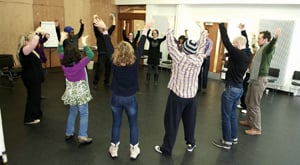A positive choice
Jenny Taylor shares Shape’s vision for disabled people to participate fully in the arts and cultural sector, and looks at the potential barriers to this

Shape provides skills, opportunities and support for disabled artists, individuals and cultural organisations. We want to help build a more inclusive cultural sector. We work with employers and venues by providing them with disability equality training, access audits and consultancy. We also provide professional development to disabled artists and job seekers. Our work with both individuals and arts organisations gives us a unique insight into the barriers that each side faces when looking to engage with the other. This article will examine the barriers that organisations face when looking to employ disabled people.
Many employers are interested in recruiting and managing disabled people, however a lack of knowledge and awareness in many cases is making this difficult to achieve in practice. There is a tendency for employers to look at the issues solely from an HR point of view. An organisation will focus on how much adjustments might cost and what are the legal, health and safety, and HR implications. Whilst organisations need to have a full understanding and commitment to all of these things they should also look at the issues from a wider perspective. Consideration of the benefits and business case of having a diversified workforce is just as important. One in three people are disabled or close to someone who is. By being positive about employing disabled people your organisation will be more appealing to a wider range of potential employees and clients. A key thing to remember is that not everyone discloses their disability, and having negative and unfriendly attitudes to disabled people could already be affecting your business.
In all likelihood you already have disabled people working for you, who, for whatever reason, have not disclosed this information. Nearly one in five people of working age (7 million, or 18.6%) in Great Britain have a disability. In addition many organisations do not realise that disabled people in the UK have £80 billion in spending power. In the last year alone 82% of disabled customers in the UK took their business to a more accessible competitor.
These figures do not include the families and friends of your disabled clients who may also be looking to support more accessible organisations.
Another barrier that employers face is how to pay for adjustments for disabled employees. What many do not realise is that adjustments are often inexpensive and simple to implement. There is also Access to Work, which is a government programme that supports disabled people and their employers by paying for work place adjustments. This can typically include computer programmes, equipment, British Sign Language interpreters, support workers and so on. We would advise all employers to learn more about this programme as it is very helpful for both employee and employer. Also, in terms of adjustments the law states that these have to be ‘reasonable adjustments’. For example, a small arts organsation would not be expected to install elevators into their premises but might be expected to use Access to Work to invest in voice recognition software. Both best practice and the laws are fair to the employer and the employee in terms of creating accessible workplaces, the idea being to work together.
OPENING DOORS
From a recruitment point of view, many disabled people look at how organisations advertise their services and employment opportunities. They are looking for hints that the organisation or employer has disability-friendly policies. One easy way to ensure this is to adopt the two-tick system within your recruitment. This means that any disabled people who meet the basic requirements for the advertised job will be put forward for interview. Adopting this system is easy, for more information please see link at the end of this article. This scheme allows you to potentially engage with people whom you might have missed during the recruitment process.
Although many disabled people are keen to find employment they do not feel confident that employers will understand their access requirements. Currently, disabled people are 2.5 times more likely to be unemployed than non-disabled people, with 62% of working-age people not in paid work, significantly higher than the 26% of the general population. Organisations can play a vital role in breaking down some of the barriers that disabled people face. This can be achieved by becoming more inclusive to their clients and employees as well as developing accessible and open recruitment.
By striving to be an open and inclusive organisation you will be able to recruit and retain a diversified and committed workforce. More and more disabled and non-disabled people are interested in working for dynamic organisations that have inclusive and open environments. Work is not just a means to an end for most people, they want to engage and identify with the culture of the organisation that they work for.
Join the Discussion
You must be logged in to post a comment.